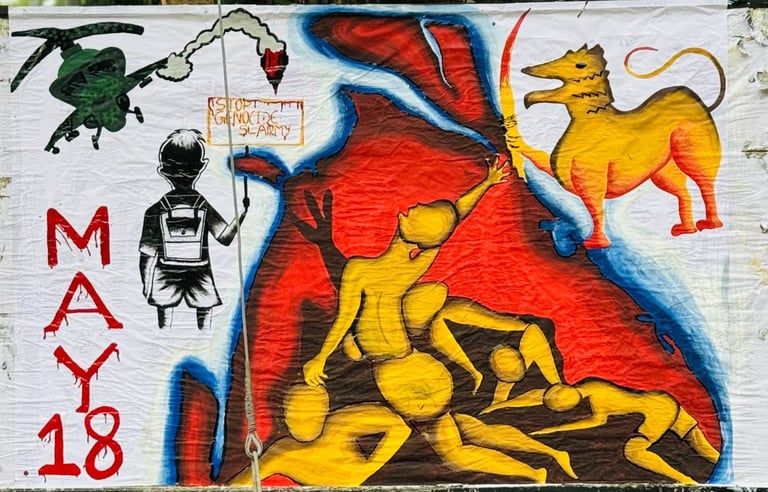Strife in Sri Lanka: the post-colonial conflict continues
PERSPECTIVES
Gini Newman
10/5/20254 min read


Sri Lanka: an island in South Asia- small in size yet vast as an ocean in its history. It is believed to be a fragment of the mythical land called Kumari Kandam. Four official religions are practised there and two languages spoken: Tamil and Sinhalese. However, language is not the only line of separation in Sri Lanka - the country itself is divided into two.
Since the British granted Sri Lanka independence in 19481, there have been ambiguous feelings towards both civil groups. This was due to the British favouring the Tamils in Northern Sri Lanka, causing the Sinhalese to feel sidelined in government and administrative jobs. This sour feeling persisted after the British's departure; the Sinhalese majority, comprising 70%, created their own rules, government, and dominated politics.
Later, the introduction of the Sinhala-Only Act 1956 (No. 33 of 1956) made the Tamils feel as though their identity was being progressively erased. First, their language, then their educational and historical books were burned until nothing was left (Chandran, 2025), not even basic human rights. Discrimination increased over the years, which eventually led to the birth of groups like the Liberation Tigers of Tamil Eelam (Schwarz, 2024). From 1983 to 2009, the country went through a prolonged and brutal civil war between the Sri Lankan government and Tamil militants. There were mass killings after mass killings. The division was only cutting deeper.
You would expect the Civil War to end here.
However, even today, the Tamils are fighting for basic human rights. Every time the Tamil community reached out to the International Criminal Court, Sri Lanka always refused to address their actions, denying any war crimes had been committed, preventing necessary international investigations from taking place.
On the 8th September, there was an interactive dialogue at the UN, where the High Commissioner spoke about his recent report on Sri Lanka (United Nations, 2025). The UN High Commissioner for Human Rights highlighted actions by the Sri Lankan government in the past year: strengthening anti-corruption laws, investigating past abuses towards the Tamil people, e.g. the Chemmani mass grave and improving workers' rights and protections for vulnerable groups. However, the High Commissioner emphasised that these measures must be accompanied by independent and transparent investigations to restore public trust.
The Sri Lankan government had written in its defence (Government of Sri Lanka, 2025) and requested time, space and international support to allow the government to resolve issues domestically, emphasising sovereignty over external intervention.
How can the government say in their report that they are introducing a number of measures to promote the economic and social well-being of the people, to strengthen reconciliation and ensure social justice, just two weeks after the reported killing of a Tamil civilian by members of the Sri Lankan Army? (Tamil Guardian, 2023)
The Tamil Guardian newsletter writes, “Tamil National People’s Front (TNPF) leader and Jaffna District parliamentarian Gajendrakumar Ponnambalam has condemned the killing of 32-year-old Ethirmanasingham Kapilraj in Mullaitivu, describing it as a 'planned murder by the Sri Lankan Army' and a stark example of the military’s ongoing hostility towards Tamils in the North-East.
Soon after this killing took place, there was a meeting between government members, army soldiers and other authorities. It did not address the wrongful death of the loyal Tamil man who had been serving the soldiers, but rather it strategised how to prevent the incident from attracting further attention, particularly from international organisations.
The Dilemma
When will Tamil individuals in Sri Lanka be able to live without fear for their safety in their own land? When will they be able to breathe without trembling? When?
The government continues to reject international investigations (New Indian Express, 2025), causing the torture and trauma suffered by the Tamil people to be buried deeper, whilst silently compounding their unjust treatment. The tortures are paramount, whether it was a Tamil child, Tamil woman or Tamil man- it didn’t matter.
Children were attacked while studying at school on their way home, and many were deeply traumatised, some unable to speak again after witnessing such tragedies. Women faced severe sexual violence and abuse (UK Government, 2013). Mothers would sometimes place symbolic jewellery of marriage on their daughters, hoping to protect them. However, these pleas were ignored by the military. Men were subjected to humiliation, arbitrary arrests and forced labour. They were treated as objects of mockery and stripped of dignity. The Tamil people's suffering turned into a spectacle.
This dilemma demands the attention of humanity. Until the truth is acknowledged and justice is delivered, the fundamental human rights promised to the Tamil people will remain an empty promise.
References:
Chandran, S. (2025) One library that began a story. State Library of New South Wales. Available at: https://www.sl.nsw.gov.au/stories/one-library-began-story (Accessed: 29 September 2025).
Government of Sri Lanka (2025) Statement to the Interactive Dialogue on the High Commissioner’s Report on Sri Lanka, 60th Session of the Human Rights Council, 8 September 2025. United Nations Human Rights Council, Geneva.
New Indian Express (2025) Sri Lankan government rejects UN’s call for international investigation into its alleged war crimes, 8 September. Available at: https://www.newindianexpress.com/world/2025/Sep/08/sri-lankan-government-rejects-uns-call-for-international-investigation-into-its-alleged-war-crimes (Accessed: 29 September 2025).
Sinhala-Only Act 1956 (No. 33 of 1956)
Schwarz, W. (2024) The Tamils of Sri Lanka. Minority Rights Group Report No. 25. London: Minority Rights Group. Available at: https://minorityrights.org/app/uploads/2024/04/the-tamils-of-sri-lanka.pdf (Accessed: 3 October 2025).
Tamil Guardian (2023) Hundreds gather for funeral of Tamil man killed by Sri Lankan soldiers in Mullaitivu, 27 August. Available at: https://www.tamilguardian.com/content/hundreds-gather-funeral-tamil-man-killed-sri-lankan-soldiers-mullaitivu (Accessed: 29 September 2025).
UK Government (2013) Sri Lanka: Country of Concern. Foreign and Commonwealth Office. Available at: https://www.gov.uk/government/publications/sri-lanka-country-of-concern/sri-lanka-country-of-concern (Accessed: 29 September 2025).
United Nations (2025) Report of the United Nations High Commissioner for Human Rights on Sri Lanka, A/HRC/60/21. 60th Session of the Human Rights Council, Geneva. Available at: https://undocs.org/A/HRC/60/21 (Accessed: 29 September 2025)
University of Jaffna -Mural; Tamil Guardian
Veritas Vincit.
Truth Prevails.
Contact Us
veritasvincit.lp@gmail.com
© 2025. All rights reserved.
